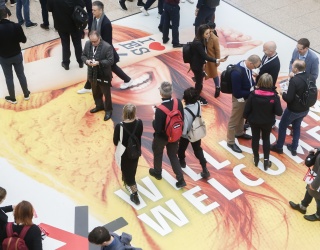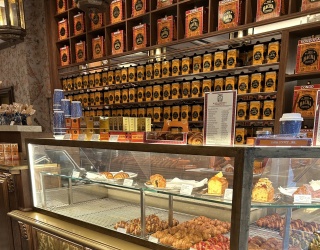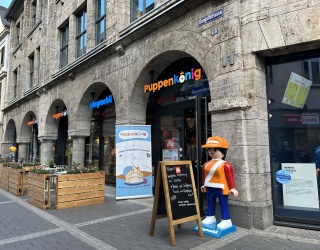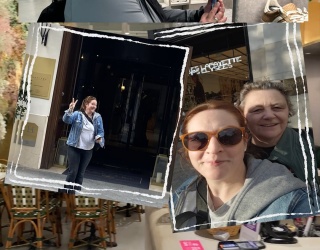Aichinger in Wendelstein near Nuremberg views itself as Europe’s leading specialist in the area of food store furnishing concepts, shop fitting and professional kitchens. The group of companies annually carries out over 1,500 furnishing projects and manufactures entirely “made in Germany“ in two factories with 26,000 m2 production space. Dr. Oliver Blank believes: too much variety in merchandise is a thing of the past, today it’s all about the shopping experience. A store needs to look great and needs to work.
Environment protection, sustainability, energy neutral supermarkets – is “green“ a trendy topic in retail at the moment?
Yes – you see this at almost all of the larger companies, like for instance at Aldi, Rewe, tegut, but also at Edeka, which last year also built CO2-neutral markets. “Green“ is definitely a topic that will gain even more importance in the coming years.
Germany likes to see itself as a trailblazer in terms of environment protection. Is that really the case, if you take a look at your German and foreign markets?
We really cannot confirm this kind of statement. For instance, waste heat recovery in countries like Australia, where people particularly pay close attention to ozone levels, is also a very big topic.
Refrigeration units have a long life span. Based on your experience, how long is this equipment in use?
In the food trade usually eight to ten years, in specialized trade, for example at the butcher, also significantly longer.
What has changed in the past ten years in terms of technology and design?
The concepts have changed. Instead of merchandise ubiquity and more and more variety of goods it increasingly is about experiencing something special, which I cannot find everywhere as a consumer. The design of a market, the entire atmosphere and ambiance – those are the things that create a palpable distinction from your average store.
The design trend per se does not exist – what’s crucial is an authentic design. More and more the focus is on accentuating product quality. The point is not to just present the merchandise, but also to stage it. Whether that means a straight or round layout –the principle of transparency has top priority. But it is critical that energy efficiency, ergonomics and hygiene – that is to say: all of the range of functions – do not take a back seat to the creative concept. A store needs to look great and needs to work.
What kinds of reductions in operating costs are possible through new investments and when do they pay off?
Needless you say there is no general answer to this, because typically several factors work together here. At the moment, the focus is particularly on reducing energy consumption. Our new energy saving wall cooling shelf LEHO reduces energy costs by up to 40 percent compared to other current products on the market. This quickly adds up to several thousand Euros per year and per store.
Sometimes the ease of maintenance and cleaning of refrigerated display cases and freezers etc. gets underestimated. If an employee spends just 15 minutes more for clean up, it adds up to two working weeks per year! That’s why so many of our customers appreciate our ARS hygiene system (an automatic cleaning- and disinfection system) in our SIRIUS fresh food counters.
What are the benefits of forced-air cooling and those of contact cooling units?
That depends on the product that’s being presented, on product turnover and the desired style of presentation. The main advantage of contact cooling is that the air doesn’t move and the merchandise therefore only minimally dries out. This advantage pays less of a role, if the product turnover is fast. You can stack products much higher in forced-air cooled counters than in contact cooling units. In Germany customers expect full displays cases. The stack heights that full shelves require, cannot be sufficiently cooled in contact cooling units.
LEDs are a hot trade fair topic. Energy consumption and low heat emission makes them also interesting for service counters. Can you put this trend into demand numbers already?
No, it’s too early for that, since light intensity, color and look-and feel of the lights are still not satisfying enough for attractive visual merchandising. Adding to this is the purchasing cost, which is still very high. Based on the rapid technological development, many customers also avoid the risk of not being able to get compatible replacement parts later. If worst comes to worst, all lighting fixtures would then have to be completely changed to ensure a consistent look.
LED light is often considered as being cold. How can this be remedied?
There are no limits – the development keeps moving along and soon you won’t be able to notice the differences between luminous colors and the mentioned “coldness“ with the human eye. At this stage the development is already much farther along than we assumed it would be just one or two years ago.
Sales counter or self service– in which direction is the pendulum currently swinging in retail?
The pendulum swings very evenly – with a tendency towards the sales counter. The willingness to invest in terms of fresh food service counters is very high in the food trade – and it keeps growing. We experience this as something positive, because after all, our core strength lies in fresh food staging and profiling. Consumers value competent expert advice and service. Retail responds to this of course, because it gets the chance to strengthen the confidence in his markets and products. The fresh competence of a grocer is nowhere better displayed than at the service counter.
It’s been said that there is a lot of potential in ready-made foods for food retailers. Do retailers now have to turn into restaurateurs? Aren’t they lacking the necessary know-how for this?
“Having to“ in this context is perhaps the wrong expression. In fact, a retailer should not let this opportunity pass him by. People have less and less time and energy to cook. Between frozen pizza and burger fast food, a retailer has a lot of room to make his mark. After all: The less mere grocery buying provides a reason to frequent a specific supermarket, the more the success of a business depends on the retailer providing his customers with reasons to visit his store – and not just to buy “raw“ foods.
Home-made fresh convenience to finish preparing at home, snacks to go, all the way to consumption at the supermarket – depending on the location there are countless variations. The supermarket has all of the ingredients for things that people like to eat on a daily basis. It stands to reason that you then also want to eat exactly where the most competent food expert is also the host – at your grocery store!
Understandably today many retailers are still unsure, whether they can master the subject and above all whether ready-to-go concepts will pay off. At the EuroShop we will show, that it can be done, how it can be done and how it pays off. The experience of multi-unit restaurant chains helps enormously in this case.
What are your trade fair highlights at the EuroShop? What do you expect from the trade fair?
The motto of our appearance is “Fresh Food Emotions“, an authentic overall concept of shopping experience, convenience and hospitality at the supermarket of the future. The technical highlight will be LEHO, the radically novel wall cooling shelf for drastic energy savings. LEHO is a new development of our company – and compared to everything that’s been around so far, a technical and functional milestone. Technology, routing of air flow and engineering were set-up completely new. This is the sum of many details, from better insulation of the rear panel all the way to using an extremely energy-saving night roller blind.
At the EuroShop we look forward to many interesting conversations with our regular customers and those who will be. Our possible concept of a supermarket of the future provides a lot of topics for discussion.
René Schellbach, EuroShop.de










